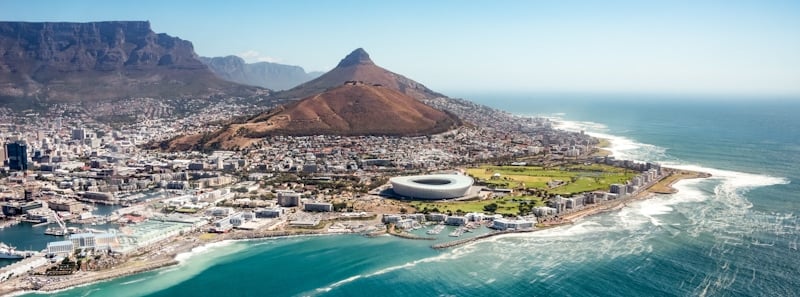When writing or proofreading manuscripts, names of regions and their capitalization rules could be tricky to discern or ascertain. This confusion can also be attributed to the fact that certain region names have direction names in their official names, such as “the Middle East”. So, should you capitalize regions when writing?
Names of regions should be capitalized if those are proper nouns or denote a country, city, continent, etc. If it’s a general noun such as a river, lake, ocean, etc., the region need not be capitalized. If these geographic areas are part of a name, however, such as “River Thames”, capitalize the term.
Popular usage sets the rules for standard practice – especially in the case of region names. Keep reading to learn everything there is to regions and their capitalization, rules for related terms and phrases, what a region is, etc.

What is Region?
Broadly speaking, a region is an area that’s divided by:
- Certain physical characteristics
- Human settlements and their impact on the physical geography, and
- The communication between the environment and humanity
Geographic regions are usually depicted by their not-so-clearly defined, and at times transitory boundaries.
A region can be a city, town, village, country, continent, or any area that comes under the jurisdiction or administration of a state.
A region could also be a group of nations. The United Kingdom, for instance, is a region that comprises four countries: Scotland, England, Northern Ireland, and Wales. Except for England, the other three countries have their own parliaments.
Similarly, the European Union is an assortment of multiple countries. It’s not a continent, nor is it a country. But because it has defined boundaries and administration, it’s a “region”.
Earth Atmosphere and Environment-Based Classifications
Besides the global continents, there are also atmospheric and hydrospheric regions that encompass the oceans, discrete climates, or environments above the water and landmasses of earth. The water and land global areas are further divided into subregions bounded by huge geographical features influencing large-scale ecologies.
The concept of a “region” is significant and used widely among the several geography branches, each of which could describe the areas or zones in region-based terms. For instance, the term “ecoregion” is used commonly in environmental geography, “bioregion” in biogeography, etc.
In domains such as ecology, physical geography, environmental geography, and zoogeography, regions are typically based on ecosystems, biomes, natural regions, drainage basins, soil types, mountain ranges, and other natural features. In terms of “human geography”, the regions and their subregions are elucidated by the ethnography discipline.
Capitalizing the Word “Region” in Sentences
The term “region” is a general noun, and it’s usually not capitalized, as a result. However, in certain pairings, the common noun appears after a name or proper noun – for instance, “the Highlands Region”. In other words, when the word “region” is a part of a name or is being specific in its meaning, the word is capitalized.
Here are a few sentences with the word “region” in them:
- The upper region’s excessive heat compelled him to descend.
- The precipitation is the maximum in the interior regions.
- The region is known for its dairy farming and also cattle fattening practices.
- The body can be divided into regions.
- Cattle-breeding techniques or practices could vary across regions.
- The particular type of cheese is made in regions with a certain kind of climate.
- In several mining regions, lengthy tunnels have been instituted for securing natural drainage.
- Urundi and Ruanda are fertile, healthy, high-lying, and thickly populated regions.
- This text isn’t a law but an abstract of the several special usages obtained in those regions.
If part of a title or headline, the word “region” can be capitalized to conform to title capitalization rules. Also, if “region” is the first word in a sentence, it is capitalized. Circling back to the “title” rule, if the headline is in sentence case and the word “region” is not the starting word of the title, “region” should be written in lowercase.
Capitalizing “Geographic” Names
When dealing with geographic terms, capitalize nouns such as “river”, “lake”, etc. only if it’s a proper name. For example, the “river” is a general noun and not capitalized. But when the term is used in a formal name, it’s capitalized, as in “the Hudson River”.
Capitalize locations in a country if the proper noun is given – in other words, the name of a region or city, such as the Congo, the Mississippi River, etc. When there is no proper name, lowercase “mountain”, “gorge”, “valley”, “beach”, and other geographical features.
Capitalizing Specific Directions

Direction-denoting terms such as north, south, east, west, etc. are not capitalized when they merely denote compass direction. For example:
- She passed the Lake Amadeus and the Reynolds range in that direction but had to turn south upon finding a tract of grassy land.
- He was instructed to walk east.
- The three islands, on Ireland’s west coast, form a natural breakwater.
- He lives on the east side of the town.
- She drove to the metro region’s west side.
- She headed east.
- America is located to the north of Mexico.
- She lives in northern Connecticut.
- We live in the eastern part of the region.
But when the terms are used to indicate a region, they are capitalized – for example, the “West Coast”. Here are a few more examples:
- the West Coast
- the Deep South
- the Eastern Seaboard
- Northern Italy
- North America
- South Africa
When the directional terms are not proper names and are affixed to proper nouns simply to denote direction, they are written in lowercase – for example, “southern France”, “northern New York”, etc. If the designation is widely known, the “direction” terms are capitalized – for instance, “Southern California”.
Here are directions capitalized in sentences:
- Customs in the West differ compared to the East.
- He moved from the West Coast to the East Coast.
- The North lost the battle.
- You must read both Eastern and Western philosophies.
- Many scholars are now studying the global South.
Directions and Names Based on Them
Words such as “southerner” and “northerner” are usually not capitalized if they denote people. For example:
- Her friend is a northerner.
The words are also not capitalized if they only indicate locations or the climate or geography of a region.
But when the words are used in specific contexts, denote people belonging to a particular region, or refer to their social, political, or cultural activities, they are capitalized.
- The Southerners and Northerners fought the civil war.
Another example, “Eastern” in the phrase “Eastern bankers” is capitalized since the word denotes a certain group of people. In “the eastern portion of Colorado”, however, “eastern” is written in small letters since it doesn’t denote people or specific culture or practice. Similar is the case with the following set of words:
- Southern hospitality; southern temperatures
- Western civilization; westerly winds
- Northern vote; northern winter
Here are a couple of sentences for further clarity on the matter:
- The Southern states didn’t vote, staying in line with tradition.
- The drought came to an end in the southern states.
When terms such as “southern district” and “western region” are used as names for specific units within an organization, capitalize them. For example:
- The Western Region reported sales to be 11 percent more than the budget for the initial four months.
When words such as “northern”, “southern”, “western”, and “eastern” precede a region or place’s name, do not capitalize them as they are only indicating a general location in a region. For example, “western Massachusetts”, “northern New Jersey”,
But when these terms are part of an actual place’s name, capitalize them, as in “Western Australia”, “Northern Ireland”, etc.
The Confusion Over Direction-Based Names Being a Proper Name
Though a direction is a general noun, it could at times be not that straightforward to ascertain whether it’s a common noun or a proper noun. For example, capitalizing “Southerner” in the sentence “As a Southerner, she had a distinct drawl” can be up for debate.
Some could argue the word “Southerner” in the sentence denotes someone who belongs to a specific region, and the letter “S” should therefore be capitalized. Others may argue that the word simply denotes the direction of the region the individual lives and must not have the capital letter.
Regardless of what side of the debate table you are on, the different thoughts clearly illustrate how differing opinions could be on the matter, causing people to use capitalization rules the way they deem appropriate.
Conclusion

The English language has grammar and usage rules by the boatload. Despite that, knowing how to capitalize names of places, regions, geographical features, directions, etc. is considered basic and should be known by people who claim to have a good command of the language.
Of all the various names or terms, direction names could be the trickiest to handle. As a general thumb rule, if a particular direction (north, south, etc.) doesn’t shout the need for “capitalization”, it’s safe to write it in lowercase. Only when it’s very apparent or writing the direction names in small letters looks completely off, capitalize them.
Just make sure you are consistent with the letter case. In most forms of writings, not capitalizing direction names when they could have been capitalized doesn’t bother the readers much. It’s the inconsistency or the abrupt switching between capitalized letters and lowercase letters is what that puts readers off.
Shawn Manaher is the founder and CEO of The Content Authority. He’s one part content manager, one part writing ninja organizer, and two parts leader of top content creators. You don’t even want to know what he calls pancakes.

